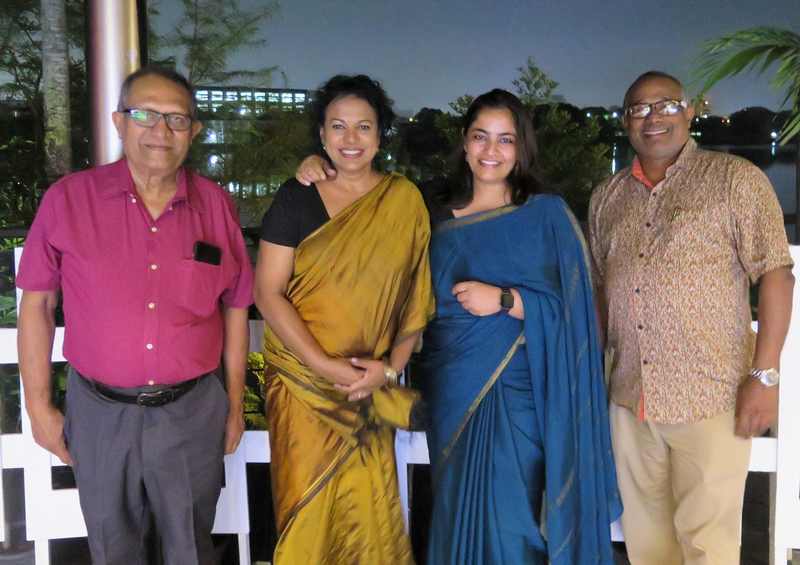
Rainforest Alliance – committed to strengthening its sustainability footprint in Sri Lanka
Colombo: The Rainforest Alliance convened a reception in Colombo recently that brought together key organisations and individuals to share its work and explore potential opportunities to collaborate and partner in Sri Lanka. The Rainforest Alliance is committed to create a landscape-level intervention in the region to address critical sustainability challenges and Sri Lanka is indeed a key priority country for the organisation given the scale of impact it has generated in the tea sector.
Speaking at the event, The Rainforest Alliance Director for South Asia, Dr. Madhuri Nanda stated, ‘Our ongoing work in Sri Lanka needs to be consolidated and partnerships curated to work towards a common agenda for sustainable development for the country. Although the Rainforest Alliance certified members and many in the plantation sector know about the value we bring in terms of sustainability, we feel the need to raise more awareness about our mandate for Sri Lanka and join forces with more like-minded organisations as there is indeed strength in a collective approach when it comes to sustainability.’
The Rainforest Alliance has been working in Sri Lanka for over a decade creating a positive environmental and social impact on 150,000 Hectares of land and 200,000 Metric Tons of produce by bringing them under sustainable agriculture practices. About 65,000 small farmers are already part of Rainforest Alliance certification system in the country. Jointly with the businesses, Rainforest Alliance has been engaging with farmers to train them towards sustainable agriculture practices and address issues such as deforestation, watershed conservation, biodiversity conservation and human-wildlife conflict. Our Sustainable Agriculture Standard promotes climate-smart and regenerative agriculture practices, alongside management of human rights issues in the plantations, for instance, child labour, forced labour, gender rights, and other rights-based issues.
The Rainforest Alliance also believes that the private sector is increasingly conscious and willing to actively engage and contribute towards meeting sustainability challenges and objectives, but lacks the trust and confidence from local communities and rights holders in some cases. The government also needs academicians with technical knowledge to guide the formulation of policies and for informed decision-making based on empirical evidence. The communities need inclusion and a seat at the table to amplify their voices towards policy formulation, beyond token representation. The farmers, especially smallholders, require training and handholding to transition to sustainable agriculture practices. Such larger ambitions can only be achieved via a transparent multistakeholder approach that would also benefit Sri Lanka towards meeting the Sustainable Development Goal (SDG) 17 – partnerships for goals. Climate adaptation for an island nation such as Sri Lanka is critical. Priority must be given to building resilience in the communities, and especially smallholders, who are among those most negatively impacted by the climate crisis. To navigate such challenges demands a proactive approach from all stakeholders to collectively join forces and bring greater impact on ground.
“The Rainforest Alliance’s work with smallholders in the tea sector in Sri Lanka is extremely welcoming and desperately needed, especially to improve their livelihoods. At the ministry of plantation, we are encouraged to see the positive impact of Rainforest Alliance’s activities and happy to support its implementation on ground” said Ravindra Hewawitharana – Secretary to the Ministry of Plantations, commenting on the work done by the Rainforest Alliance.
For more information please contact Jehan CanagaRetna – Consultant, Rainforest Alliance, Sri Lanka on 0777775159

About the Rainforest Alliance
The Rainforest Alliance is an international non-profit organization working in 70 countries at the intersection of business, agriculture and forests. The Rainforest Alliance is creating a more sustainable world by using social and market forces to protect nature and improve the lives of farmers and forest communities. By bringing farmers, forest communities, companies, and individuals together it addresses some of the most pressing social and environmental challenges of today. The organization changes the way the world produces, sources and consumes, with a focus on cocoa, coffee, tea, bananas, forest products, and palm oil through its certification program, supply chain services, landscape management, and advocacy. In 2020, more than 6.8 million hectares of land and more than 2.3 million farmers were certified according to the Rainforest Alliance or UTZ standards, which are designed to improve economic, environmental, and social sustainability.


